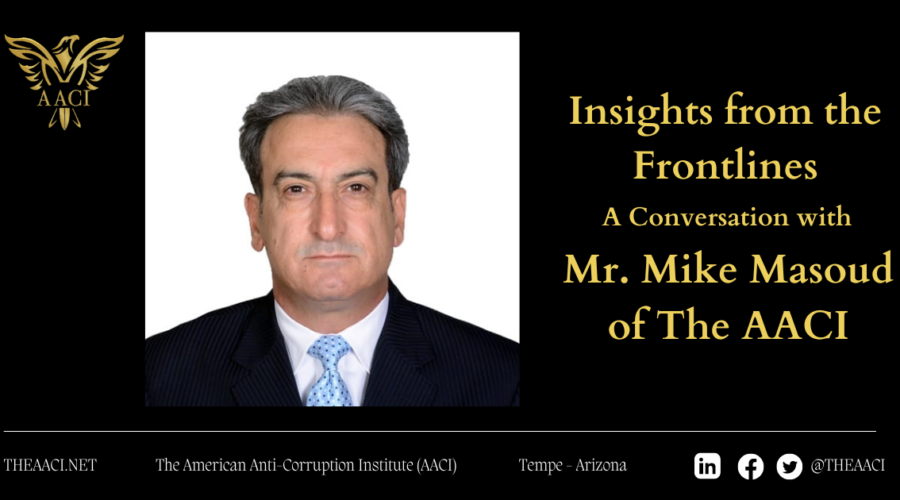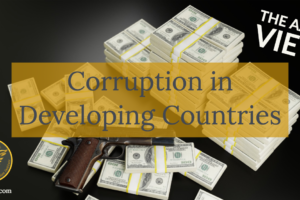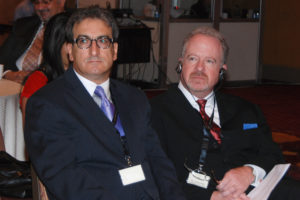January 25, 2022
Today we have the pleasure of speaking with Mr. Mike Masoud, the senior director of The American Anti-Corruption Institute (AACI) in the Middle East and Africa. Mr. Masoud has been with The AACI for over ten years. He has played a vital role in the organization’s efforts to combat corruption and promote the adoption and effective implementation of the Ten Principles of Fighting Corruption promulgated by The AACI. We will ask him about his background, the specific challenges he faces in his work, and the impact of The AACI in the region. Mr. Masoud’s insights and experiences will give us a deeper understanding of the fight against corruption in the Middle East and Africa. We are grateful for the opportunity to speak with him.
The AACI Media: Can you tell us about your background and how you became the senior director of The American Anti-Corruption Institute (AACI) in the Middle East and Africa?
Mike Masoud: I have an accounting, auditing, and anti-corruption background, and I have always been passionate about fighting corruption and promoting transparency, accountability, and the prevalence of the rule of law. I joined The AACI in 2012 as a technical advisor of The AACI in the Middle East and Africa. Over time, I worked my way up to my current position as a senior director, where I led the organization’s efforts in the Middle East and Africa.
The AACI Media: Can you describe some challenges you face in pursuing your mission of fighting corruption in the Middle East and Africa?
Mike Masoud: One major challenge is the lack of strong institutions and effective legal frameworks in many countries in the region. Without these, it can be challenging to hold corrupt officials accountable and create a culture of transparency and integrity. Additionally, corruption is deeply ingrained and pervasive in some countries, making it difficult to combat.
The AACI Media: Can you share an example of a project or campaign that The AACI has undertaken in the region that you believe has had a significant impact?
Mike Masoud: One project I am particularly proud of is our partnership with Lebanon Certified Anti-Corruption Managers (LCACM) to provide the premier anti-corruption certification program: Certified Anti-Corruption Manager (CACM), to the Lebanese Armed Forces (LAF). In addition, LAF integrated the Certified Anti-Corruption Fellow (CACF) into the curriculum of Fouad Chehab Academy for Command and General Staff. Currently, The AACI has more than 44 CACM of high-ranking officials and 24 CACF in LAF. LAF sets the example in pursuing the institutionalization of fighting corruption in its institution in a country where corruption is rife, and the economy is in free fall.

The AACI Media: How does The AACI work to involve and empower local communities in the fight against corruption?
Mike Masoud: The effective fight against corruption is always local. Therefore, and as a policy, we fully abide by local laws and, of course, the applicable US laws. We believe there is a significant lack of proper and adequate anti-corruption knowledge at all levels of management in all institutions. Therefore, we provide decision makers at all institutions with our premier anti-corruption certification programs: Certified Anti-Corruption Manager (CACM), and Certified Anti-Corruption Fellow (CACF). We also provide anti-corruption certification for entities. Further, we provide universities and other academic institutions with the CACF to engage their students and faculty.
Our certification programs mentioned above help local communities to fight corruption intelligently and adopt and implement the ten principles of fighting corruption promulgated by The AACI.
The AACI Media: Can you discuss the role of technology in your work and how it is being used to combat corruption?
Mike Masoud: Technology is playing an increasingly important role in our work. For example, we use data analytics to detect corruption patterns, social media, and other digital platforms to raise awareness and mobilize citizens. Additionally, we are experimenting with blockchain technology to create tamper-proof records that can be used to increase transparency and trust in public institutions. We also closely monitor the developments in the relevant technology to combat money laundering and support whistleblowing.
The AACI Media: How does The AACI measure the impact of its work in the region?
Mike Masoud: We use a variety of methods to measure the impact of our work, including monitoring and evaluation of specific projects, tracking changes in national corruption indices (if any), and monitoring the corruption prevalence in the region.
The AACI Media: Can you discuss any obstacles you encountered in your job and how you overcame them?
Mike Masoud: The primary obstacle we often encounter is resistance from corrupt officials and politicians who stand to lose from our work. We have found that building strong partnerships with civil society organizations, media, and government agencies can help to overcome this resistance and create a more conducive environment for change. Additionally, we make sure to be very careful in our approach and not to put ourselves or our partners at risk.
The AACI Media: Can you discuss any collaborations or partnerships you have had with other regional organizations or governments?
Mike Masoud: Due to the deeply rooted corrupt practices in many countries in the region and the resistance to our work, as I said above, we have had few successful collaborations and partnerships with other organizations and governments in the region. For example, we have worked on several projects with Lebanon Certified Anti-Corruption Managers (LCACM) . We have also provided our learning program services to regional and local parties in Saudi Arabia, Qatar, Jordan, Palestine, Lebanon, Egypt, Nigeria, and Kenya.
The AACI Media: How does The AACI work to ensure that its efforts to combat corruption are sustainable in the long term?
The AACI Media Sustainability is a crucial focus for us. We recognize that lasting change requires a multi-faceted approach that addresses the root causes of corruption and builds the capacity of local actors to demand transparency, the prevalence of the rule of law, effective and independent judiciary, and accountability. We, therefore, invest in building strong partnerships with civil society organizations, media, local private sector partners, and government agencies, as well as innovative and planned capacity-building programs for local activists and organizations working to combat corruption in their communities. Additionally, we work to promote legal and institutional reforms that can help create a more conducive environment for change and ensure our efforts’ sustainability.”
The AACI Media: Can you discuss any plans or projects The AACI has planned for the region?
Mike Masoud: We are currently focused on expanding our work to more countries in the region and deepening our impact in the countries where we already operate. We also plan to launch a new anti-corruption certification program titled ” Certified Anti-Corruption Expert Manager (CACEM).” We shall also launch several new initiatives to engage women and youth in fighting corruption. Additionally, we are always looking for opportunities to collaborate with other regional and local organizations and governments to achieve our shared goal of fighting corruption and promoting the Ten Principles of Fighting Corruption promulgated by The AACI.

The AACI Media: Thank you, Mr. Masoud, for taking the time to speak with us and for sharing your valuable insights and experiences in the fight against corruption in the Middle East and Africa. Your dedication and commitment to this vital work are truly inspiring. Your contributions have not gone unnoticed, and we wish The AACI all the best in its future endeavors.
Mike Masoud: Thank you. You are most welcome.











































